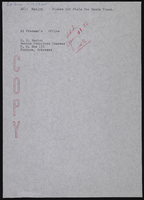Search the Special Collections and Archives Portal
Search Results
Cathren J. Holder oral history interviews
Identifier
Abstract
Oral history interviews with Cathren J. Holder conducted by Claytee D. White on June 4 and 15, 1996 for the African Americans in Las Vegas: a Collaborative Oral History Project. In this interview, Holder talks about her childhood and education in Fordyce, Arkansas, her move to Las Vegas, Nevada in 1952, and her first experience of living in a two room shack with her older brother and his family. She then discusses her work, marriage, places she shopped, and changes in the Westside since her arrival.
Archival Collection
Audio recording clip of interview with Lucille Bryant by Claytee D. White, December 13, 1995
Date
Archival Collection
Description
Part of an interview with Lucille Bryant conducted by Claytee D. White on December 13, 1995. In the clip, Bryant compares economic opportunities in Tallulah and Las Vegas in the 1950s.
Sound
Tallulah
Authority Link
No description.
Broader
Feature
Geographic Location
Pat Feaster oral history interview
Identifier
Abstract
Oral history interview with Pat Feaster conducted by Claytee D. White on July 1, 1996 for the African Americans in Las Vegas: a Collaborative Oral History Project. In this interview, Feaster relates how her mother made the decision to leave Fordyce, Arkansas for better economic opportunity and moved to Las Vegas, Nevada in 1942. She describes travelling across the country, living in a one-room structure in the Westside of Las Vegas, and attending the Westside School. She discusses her mother's employment at the Red Rooster Restaurant and then at the Algiers Hotel. She talks at length about her own educational journey after leaving school at fifteen, then returning for her GED and later, a college degree after the birth of her fifth child. She discusses how the decision to improve her education helped her develop a twenty-six year career at the Clark County Health District. She also discusses the Fordyce Club and many important personalities in Las Vegas' Black community.
Archival Collection
Ida Webb oral history interview
Identifier
Abstract
Oral history interview with Ida Webb conducted by Claytee D. White on February 29, 1996 for the African Americans in Las Vegas: a Collaborative Oral History Project. In this interview, Webb discusses her childhood in the American South. She discusses her family's move from Tallulah, Louisiana to McNary, Arizona, and then their migration to Las Vegas, Nevada. Webb shares her experiences as a young African American mother in Las Vegas in the 1940s and the things her and her husband did to provide for their family. She shares her views on her marriage and her views on African American culture of the time. Webb discusses her husband's civic involvement and his job at the Las Vegas Sun. She details her experiences working in the hospitality industry for such early casinos as the El Rancho Hotel & Casino, The Flamingo Hotel & Casino, and the Last Frontier Hotel & Casino. She shares her own civic involvements and her participation in the Culinary Workers Union Local 226.
Archival Collection
Inez and Edward Harper oral history interview
Identifier
Abstract
Oral history interview with Inez and Edward Harper conducted by Claytee D. White on July 18, 1996 for the African Americans in Las Vegas: a Collaborative Oral History Project. In this interview, the Harpers talk first about their upbringing and education in Fordyce, Arkansas. Inez Harper explains how she came to Las Vegas, Nevada at the age of sixteen with her first husband in 1953; Edward Harper explains that he came two years later, working in construction until his marriage to his first wife and moving to Los Angeles, California in 1957. The couple met after his return to Las Vegas in 1960 and married in 1962. Together they discuss employment opportunities, income, the living conditions on the Westside and the entertainment venues on Jackson Street. They also remark on their perspective of race relations and discrimination in Las Vegas in the 1960s and 1970s.
Archival Collection

